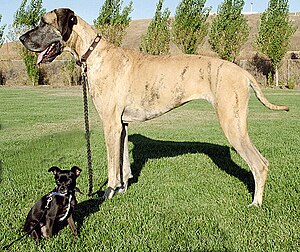Dog: Difference between revisions
m Reverted 1 edit by 209.7.4.147 identified as vandalism to last revision by GoblinBot4. (TW) |
|||
| Line 36: | Line 36: | ||
== Origin of dogs == |
== Origin of dogs == |
||
All dogs are descended from [[wolf|wolves]] |
All dogs are descended from [[wolf|wolves]]. This is known because [[DNA]] [[genome]] [[wikt:analysis|analysis]] has been done to find out.<ref>Lindblad-Toh K, Wade CM, Mikkelsen TS ''et al.'' 2005. Genome sequence, comparative analysis and haplotype structure of the domestic dog. ''Nature'' '''438''' pp803–819</ref><ref>Savolainen, Peter; Ya-ping Zhang, Jing Luo, Joakim Lundeberg, Thomas Leitner 2002. Genetic evidence for an East Asian origin of domestic dogs. ''Science'' '''298''' pp1610–3.</ref> They have been {{broken wikt link|bred|bred}} by humans. This is called [[selective breeding]] or ''artificial selection''. The earliest fossil of a domestic dog that has been found is from 31,700 years ago in Belgium <ref>[http://www.msnbc.msn.com/id/27240370 World's first dog lived 31,700 years ago, ate big] Jennifer Viegas , Discovery News, 10/17/2008</ref>. |
||
== Dogs and humans == |
== Dogs and humans == |
||
Revision as of 14:45, 9 May 2011
| Domestic dog Temporal range: Late Pleistocene - Recent
| |
|---|---|

| |
| other images of dogs | |
Domesticated
| |
| Scientific classification | |
| Domain: | |
| Kingdom: | |
| Phylum: | |
| Class: | |
| Order: | |
| Family: | |
| Genus: | |
| Species: | |
| Subspecies: | C. l. familiaris
|
| Trinomial name | |
| Canis lupus familiaris (Linnaeus, 1758)
| |

The dog (Canis lupus familiaris) is a mammal from the family Canidae. It has been domesticated by humans for a long time. It was the first animal ever to be domesticated. Dogs are used by humans for many different things, for work and as pets. They are a popular pet because they are usually playful, friendly, and listen to humans. Thirty million dogs in the United States are registered as pets.[1] Dogs eat both meat and vegetables, often mixed together and sold in stores as dog food. Dogs have jobs such as police dog, army dog, seeing eye dog, fire dog, messenger dog, and much more.
They are sometimes called "canines" from the Latin word for dog - canis. Sometimes people also use "dog" to describe other canids, such as wolves. A baby dog is called a pup or puppy. A dog is called a puppy until it is about one year old.
Dogs are sometimes referred to as "man's best friend" because they are kept as domestic pets and are usually loyal and like being around humans.
Appearance and behaviour
Dogs can smell and hear very well, but cannot see well in color or they are color blind. Dogs have four legs and make a "bark" or "woof" sound. Dogs often chase cats, and most dogs will fetch a ball or stick.
Dogs usually live about 10 years or more. The size and the breed of the dog may change how long the dog lives. Smaller dog breeds usually live longer.[source?]
Like wolves, wild dogs travel in groups called packs. Packs of dogs are ordered by rank, and dogs with low rank will submit to other dogs with higher rank. The highest ranked dog is called the alpha male. A dog in a group helps and cares about others. Domesticated dogs often view their owner as the alpha male.
Origin of dogs
All dogs are descended from wolves. This is known because DNA genome analysis has been done to find out.[2][3] They have been bred by humans. This is called selective breeding or artificial selection. The earliest fossil of a domestic dog that has been found is from 31,700 years ago in Belgium [4].
Dogs and humans
Dogs have lived with people for at least 30,000 years. Dogs can serve people in many ways. They are often called "man's best friend" because of their kind nature. For example, there are guard dogs, hunting dogs, herding dogs, and guide dogs for blind people. There are also dogs that are trained to smell for diseases in the human body or to find bombs or illegal drugs. These dogs sometimes help policemen in airports or other areas. Sniffer dogs (usually beagles) are sometimes trained for this job. Dogs have even been sent by Russians into outer space, a few years before any human being. The first dog sent up was called Laika, but died while there.
Dog breeds

- See also List of dog breeds.
There are at least 800 breeds (kinds) of dogs. Dogs whose parents were the same breed will also be that breed: these dogs are called purebred or pure pedigree dogs. Dogs with parents from different breeds no longer belong to one breed: they are called mutts, mixed-breed dogs, hybrids, or mongrels. Some of the most popular breeds are sheepdogs, collies, poodles and retrievers. It is becoming popular to be breed two different breeds of dogs and calling the new dog's breed a name that is a mixture of the parents' breeds' two names. A puppy with a poodle and a pomeranian as parents might be called a Pomapoo. These kinds of dogs, instead of being called mutts, are known as designer breeds. These dogs are often bred for show, or prize winnings.
Photogallery
References
- ↑ Gifford, Clive (2002). Family Flip Quiz Geography. Bardfield Centre, Great Bardfield, Essex, CM7 4SL: Miles Kelly Publishing. ISBN 1-84236-146-5.
{{cite book}}: Unknown parameter|coauthors=ignored (|author=suggested) (help)CS1 maint: location (link) - ↑ Lindblad-Toh K, Wade CM, Mikkelsen TS et al. 2005. Genome sequence, comparative analysis and haplotype structure of the domestic dog. Nature 438 pp803–819
- ↑ Savolainen, Peter; Ya-ping Zhang, Jing Luo, Joakim Lundeberg, Thomas Leitner 2002. Genetic evidence for an East Asian origin of domestic dogs. Science 298 pp1610–3.
- ↑ World's first dog lived 31,700 years ago, ate big Jennifer Viegas , Discovery News, 10/17/2008
Template:Link FA Template:Link FA Template:Link FA Template:Link FA





